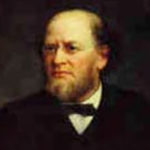Quotes about Self-Centeredness
Today, one of the greatest threats to evangelical preaching comes from the invasion of the church by Adler-Maslow, etc., self-image, self-worth dogmas. Passage after passage in the Bible has been distorted in order to conform to these teachings, with the result that you end up preaching man and his supposed worth rather than Christ. Sometimes that “worth” has been seen as intrinsic, sometimes it has been considered to be the result of salvation.
Preaching With Purpose, Zondervan, 1982, p. 188. Get this book!
The great hymns of the church are on the way out. They are not gone entirely, but they are going and in their place have come trite jingles that have more in common with contemporary advertising ditties than the psalms. The problem here is not so much the style of the music, though trite words fit best with trite tunes and harmonies. Rather it is with the content of the songs. The old hymns expressed the theology of the Bible in profound and perceptive ways and with winsome memorable language. Today’s songs are focused on ourselves. They reflect our shallow or nonexistent theology and do almost nothing to elevate our thoughts about God. Worst of all are songs that merely repeat a trite idea, word, or phrase over and over again. Songs like this are not worship, though they may give the church-goer a religious feeling. They are mantras, which belong more in a gathering of New Agers than among the worshiping people of God.
Living God’s way means putting away your self-centeredness and committing yourself to follow God’s Word in spite of any feelings to the contrary.
Self-Confrontation Manual, Lesson 5, Page 5, Used by Permission of the Biblical Counseling Foundation.
Self-belittlement, self-exaltation, and self-pity all indicate a preoccupation with self. Inordinate attention to self is the exact opposite of God’s commandments to love Him and others. A self-focus also prohibits the development of a Christlike servant attitude in you. If you try to save your life by focusing on self, you will reap certain consequence; instead of saving your life, you will lose it.
Self-Confrontation Manual, Lesson 9, Page 4, Used by Permission of the Biblical Counseling Foundation.
The danger for us is that we will want to keep up with our entertainment culture and its focus on the eyes by turning our worship into a religious stage show. We must walk a fine line between offering worship that is appealing and engaging without becoming simply a splashy performance, and worship that has depth without becoming tedious and flat.
Preoccupied with ourselves, we have lost the grace of being thankful. It is sad to live in a world where there is no one to thank because we have ourselves become the cause and source of all good things.
The man-centeredness of many churches today makes a mockery of sound doctrine. While centering their message on how to feel better about yourself by self-improvement or how to have a better life now, these churches forgo the centrality of Christ and make mention of the Bible in only the most superficial ways. The grace of God is exchanged for the efforts and abilities of man for salvation and the Christian life. The attitude of “if it’s to be, then it’s up to me” has replaced the view of a sovereign God who is working out His purpose and plan in His creation.
Today, the pressure to fill auditoriums and services has driven many pastors to place the felt needs, or tastes, of the people above their duty to Christ. On every hand we hear of the Gospel being molded into a non-confrontative message intended to meet felt needs and impress the sinful heart. And, by most standards, this new philosophy of church life is working, as more and more auditoriums are filled with people hungry for a message that will affirm that they are actually on fairly good terms with the Almighty. But the biblical message is the message of the cross. It cuts right across the grain of the modern age’s preoccupation with pride, tearing down the façade and exposing the wretchedness of the human heart… Unfortunately, while the modern “un-gospel” may fill seats, it is the true gospel of sin and grace that is “the power of God unto salvation” (Rom. 1:16).
Appointed to Preach, Christian Focus Publications, 1999, p. 46. Get this book!
Nothing in the world so tends to defile the imagination, to pervert the affections, and to corrupt the morals, as self-consciousness. You know it is connected with every disease and morbid action of the body. …All self-consciousness is of the very essence and nature of sin.
The ego is incredibly busy – in other words, it is always drawing attention to itself. It is incredibly busy trying to fill the emptiness. And it is incredibly busy doing two things in particular – comparing and boasting.
The essence of gospel-humility is not thinking more of myself or thinking less of myself, it is thinking of myself less… True gospel-humility means I stop connecting every experience, every conversation, with myself. In fact, I stop thinking about myself. The freedom of self-forgetfulness. The blessed rest that only self-forgetfulness brings.
If we only spent more of our time in looking at Him we should soon forget ourselves.
Spiritual Depression – Its Causes and its Cures, 1965, p. 88, Used by Permission from Elizabeth Catherwood (daughter). Get this book!
Man’s basic problem is preoccupation with self. He is innately beset with narcissism, a condition named after the Greek mythological character Narcissus, who spent his life admiring his reflection in a pool of water. In the final analysis, every sin results from preoccupation with self. We sin because we are totally selfish, totally devoted to ourselves, rather than to God and to others.
Self-centered Christians who serve the Lord halfheartedly seldom have to pay a price for their faith. They are of little threat to Satan’s work because they are of little benefit to Christ’s.
You know the perfect storm? Not when you fail, but when you succeed and you finally get your perfect life, with you at the center. It’s the poison of your kingdom coming and your will being done.
Our local deity is not Jesus. He goes by the name Jesus. But in reality, our local deity is Jesus Jr.
Our little Jesus is popular because he is useful. He makes us feel better while conveniently fitting into the margins of our busy lives. But he is not terrifying or compelling or thrilling. When we hear the gospel of Jesus Jr., our casual response is “Yeah, that’s what I believe.” Jesus Jr. does not confront us, surprise us, stun us. He looks down on us with a benign, all-approving grin. He tells us how wonderful we really are, how entitled we really are, how wounded we really are, and it feels good.
Jesus Jr. appeals to the flesh. He does not accept the things of the Spirit of God, for they are folly to him. He is not able to understand them, much less impart them, because Jesus Jr. is the magnification of Self, the idealization of Self, the absolutization of Self turning around and validating Self, flattering Self, reinforcing Self. Jesus Jr. does not change us, because he is a projection of us.
Jesus is right. It is not the Christian doctrine of heaven that is a myth, but the humanistic dream of utopia (Roy Clements).
Children are rude because they are so naturally egocentric. It’s their needs, their comforts, their feelings that they demand be met- usually at the expense of weary parents. Of course, self-centeredness is natural, expected behavior in infancy and tolerable in toddlers, but it becomes downright unbearable in school-age children. Proper manners can be a most effective tool in teaching children that they are not the center of the universe. And as the realization grows, they will be well on their way to becoming civilized rather than savage (Kent and Barbara Hughes).
Disciplines of a Godly Family, Crossway Books, 2004, p. 124. Get this book!
Job had been talking as if he knew exactly how God should run the world. His sense of integrity had been the basis of his presumptuous claim that God should have treated him better. Outraged that he could not square his innocence with his fate, Job had dared to challenge and judge his Creator…(therefore) Yahweh’s answer came in the form of a rebuke – an overwhelming reminder that the first religious obligation of the creature is to acknowledge and glorify the Creator.
Believers may not often realize it, but even as believers we are either centered on man or centered on God. There is no alternative. Either God is the center of our universe and we have become rightly adjusted to Him, or we have made ourselves the center and are attempting to make all else orbit around us and for us (Vern Fromke).
God’s plan was to bring into being a host of sons and daughters whom He would indwell; through whom He would live and manifest Himself; and in and through whom Christ would reign supreme. We are the beneficiaries of that plan. God, in His love and grace, has made us a part of His plan. But we are not the center of it; Christ is.
The average person in the world today, without faith and without God and without hope, is engaged in a desperate personal search throughout his lifetime. He does not really know where he has been. He does not really know what he is doing here and now. He does not know where he is going. The sad commentary is that he is doing it all on borrowed time and borrowed money and borrowed strength; and he already knows that in the end he will surely die! Man, made more like God than any other creature, has become less like God than any other creature. Created to reflect the glory of God, he has retreated sullenly into his cave; reflecting only his own sinfulness. Certainly it is a tragedy above all tragedies in this world that man, made with a soul to worship and praise and sing to God’s glory, now sulks silently in his cave.
Self-will – a stubborn, unteachable spirit; an arguing, talkative spirit; harsh, sarcastic expression; an unyielding, headstrong disposition; a driving, commanding spirit; a disposition to criticize and pick flaws when set aside and unnoticed; a peevish, fretful spirit; a disposition that loves to be coaxed and humored?
The god-who-serves-ME requires flattery, not worship.















